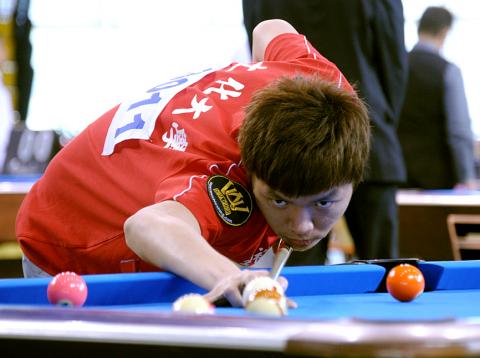The Sports Affairs Council yesterday said it regretted a decision by Wu Chia-ching (吳珈慶), the nation’s top pool player, to relocate to China and take Chinese citizenship to participate in international tournaments.
Wu, 22, rose to fame after he won the world 8-ball and 9-ball championships in 2005 at the age of 15. He first courted controversy two years ago when it was discovered that he was considering applying for Singaporean citizenship to further his career.
Wu said yesterday that his decision to become a citizen of the People’s Republic of China (PRC) was made purely for professional reasons and should not be regarded in a political light.

Photo: Hsu Ming-li, Taipei Times
However, the council said Wu’s decision could have consequences.
“While the application was filed for Wu’s personal reasons … the action could have violated regulations in Taiwan, given the complicated cross-strait situation,” the council said in a statement.
Still, there were some words of encouragement.
“We respect his choice,” council spokesperson Steven Chen (陳士魁) said. “We hope that he can perform as well as other Taiwanese athletes and he has our blessings.”
While the council had no right to stop athletes from seeking a professional sports career abroad, the nation should assess whether it provides a good environment for athletes, Chen said.
“We have budgeted the Sports Development Fund (運動發展基金) to subsidize excellent athletes,” he said. “Hopefully we can retain more talented people in Taiwan.”
Chinese Taipei Billiards Association chairman Tu Yung-hui (涂永輝) said the association was unaware that Wu, 22, would represent China at the Beijing Open hosted by the World Pool-Billiard Association (WPA) on Monday until it was officially informed by the China Billiard Association (CBA) on Wednesday.
The CBA sent Tu a fax showing Wu had obtained a temporary resident identification card for the PRC, meaning that he would soon receive his official residency documents.
During a telephone interview with the Taipei Times, Wu’s uncle, who refused to give his name, but is with Wu in Beijing, accused Tu and the Chinese Taipei Billiard Association of “destroying” Wu’s career before he could accept a nationality deal offered by Singapore.
Wu’s decision was made so that he could focus on playing pool, the uncle said, adding that the CBA had never approached Wu.
“Wu … has been staying with me in Shenzhen, Guangdong Province, since March last year,” the uncle said.
Tu said he had met Wu and his father in 2009 after learning that Wu was considering becoming a Singaporean citizen.
“We told them that if he chose to go to Singapore, he could not participate in any tournament in Taiwan, nor could he represent Taiwan at any international competition,” Tu said.
Wu was also told he might be asked to return a NT$900,000 national award if he joined Singapore’s national team, Tu said.
While the association cannot guarantee an annual salary, Tu said Wu had plenty of opportunities to play in Taiwan and could easily have collected award money.
Wu went ahead with his decision to go to Singapore, Tu said as he showed reporters an agreement signed by Wu saying he understood the consequences.
ADDITIONAL REPORTING BY CNA

CHAOS: Iranians took to the streets playing celebratory music after reports of Khamenei’s death on Saturday, while mourners also gathered in Tehran yesterday Iranian Supreme Leader Ayatollah Ali Khamenei was killed in a major attack on Iran launched by Israel and the US, throwing the future of the Islamic republic into doubt and raising the risk of regional instability. Iranian state television and the state-run IRNA news agency announced the 86-year-old’s death early yesterday. US President Donald Trump said it gave Iranians their “greatest chance” to “take back” their country. The announcements came after a joint US and Israeli aerial bombardment that targeted Iranian military and governmental sites. Trump said the “heavy and pinpoint bombing” would continue through the week or as long

TRUST: The KMT said it respected the US’ timing and considerations, and hoped it would continue to honor its commitments to helping Taiwan bolster its defenses and deterrence US President Donald Trump is delaying a multibillion-dollar arms sale to Taiwan to ensure his visit to Beijing is successful, a New York Times report said. The weapons sales package has stalled in the US Department of State, the report said, citing US officials it did not identify. The White House has told agencies not to push forward ahead of Trump’s meeting with Chinese President Xi Jinping (習近平), it said. The two last month held a phone call to discuss trade and geopolitical flashpoints ahead of the summit. Xi raised the Taiwan issue and urged the US to handle arms sales to

State-run CPC Corp, Taiwan (CPC, 台灣中油) yesterday said that it had confirmed on Saturday night with its liquefied natural gas (LNG) and crude oil suppliers that shipments are proceeding as scheduled and that domestic supplies remain unaffected. The CPC yesterday announced the gasoline and diesel prices will rise by NT$0.2 and NT$0.4 per liter, respectively, starting Monday, citing Middle East tensions and blizzards in the eastern United States. CPC also iterated it has been reducing the proportion of crude oil imports from the Middle East and diversifying its supply sources in the past few years in response to geopolitical risks, expanding

Pro-democracy media tycoon Jimmy Lai’s (黎智英) fraud conviction and prison sentence were yesterday overturned by a Hong Kong court, in a surprise legal decision that comes soon after Lai was jailed for 20 years on a separate national security charge. Judges Jeremy Poon (潘兆初), Anthea Pang (彭寶琴) and Derek Pang (彭偉昌) said in the judgement that they allowed the appeal from Lai, and another defendant in the case, to proceed, as a lower court judge had “erred.” “The Court of Appeal gave them leave to appeal against their conviction, allowed their appeals, quashed the convictions and set aside the sentences,” the judges